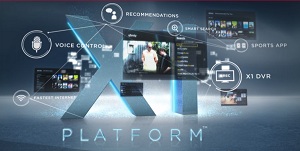Comcast, Cox In X1 Licensing Talks
The smarter way to stay on top of the multichannel video marketplace. Sign up below.
You are now subscribed
Your newsletter sign-up was successful

Comcast Cable president and CEO Neil Smit confirmed on the MSO’s fourth quarter earnings Tuesday that the operator is in talks with Cox Communications about licensing X1, Comcast’s next-gen, cloud-based video platform.
The revelation comes the same day Reuters reported that the two MSOs were in “advanced discussions” about licensing X1, noting that the talks involve ways for Cox to white-label the X1 platform and apply its own branding.
An industry source familiar with the idea told Multichannel News in December that it’s possible that Comcast could try to repackage Xfinity TV as a hosted, white label service, noting that the approach is viewed as a way for Comcast to drive more value out of the platform while also boosting the scale of the X1 ecosystem without requiring Comcast to acquire more cable systems.
Smit didn’t go into that level of detail Tuesday, but did say that Comcast and Cox are working together to identify which elements of X1 might support Cox’s next-generation video service.
Comcast's licensing strategy for X1 has been underway since at least last year. Comcast chairman and CEO Brian Roberts first told Multichannel News last fall in the publication's Operator of the Year cover story (subscription required) that Comcast is looking to license X1 to other operators.
Comcast has rolled out X1 to all its systems. In addition to featuring an advanced user interface that can be applied to set-tops and gateways as well as tablets and other connected devices, X1 is also considered a key component of Comcast’s overall IP video migration.
Cox, meanwhile, has already shown interest in using technologies that are already powering X1.
The smarter way to stay on top of the multichannel video marketplace. Sign up below.
At the SCTE Cable-Tec Expo in Atlanta last October, Steve Calzone, Cox’s director of video applications development, said Cox was evaluating the Reference Design Kit (RDK), a pre-integrated software bundle for set-tops and gateways that’s being managed by Comcast and Time Warner Cable. Comcast’s X1 platform is the first product to use RDK-based devices.
The RDK is not an end-to-end “cure all for our applications development, [but] it’s a stepping stone to help us move a lot faster,” Calzone said of the RDK at the time. “The positives we see with our evaluation is that it’s an open infrastructure.”
For now, Cox’s top-of-the-line video product relies on a set-top-resident navigation platform called Trio that was developed in tandem with Cisco Systems/NDS. The Cox guide features a recommendations engine from ThinkAnalytics that provides personal picks for up to eight individual users. Cox has since extended several elements of that set-top box interface work to Contour, a complementary app for iOS- and Android-powered tablets.
Cox said it is evaluating X1 as it considers the longer-term direction of its video platform.
“Platforms that deliver the Contour video experience will continue to evolve, just as the video product has throughout the five decades we’ve served customers,” Cox spokesman Todd Smith said. “Cox is investigating many options for the delivery of our next generation video services. One of the options being assessed is Comcast’s X1 platform. This evaluation of the X1 platform is in keeping with our forward-looking focus, and being open to new partnerships as we respond to a quickly evolving video landscape.”
Beyond Cox?
Comcast’s licensing strategy could bridge the X1’s advanced capabilities to other independent cable operators, including tier 2s, that don’t have the resources to develop and maintain such a product.
Rich Fickle, the president and CEO of the National Cable Television Cooperative, told Multichannel News in a recent interview that it’s too early to predict how receptive the organization and its constituents would be to an X1 licensing model, labeling such discussions as “informal.”
“Technically, the execution of it will take some time and work to make it friendly to other companies,” Fickle said, noting that he’s been told that 2015 offers a “realistic timetable” for when Comcast might be ready to ramp up its X1 licensing efforts.
The notion of licensing X1 has some upside, particularly as operators mull their IP video transitions, Joe Jensen, the chief technology officer of Buckeye CableSystem, said.
“It’s not something we’re ready to do, but it’s something we’ll consider in the future,” he said when asked about his interest in licensing X1. He stressed that “nothing definitive” has been put forth on the idea yet.
“I think Comcast has made a valiant attempt to try to put the right features in place to do something like that,” Jensen said. “We want to be the aggregator of choice, to be the place where our customers go to find and consumer entertainment."
If licensing X1 could help to “unify the customer experience across cable, I think that’s certainly a positive,” he added.
